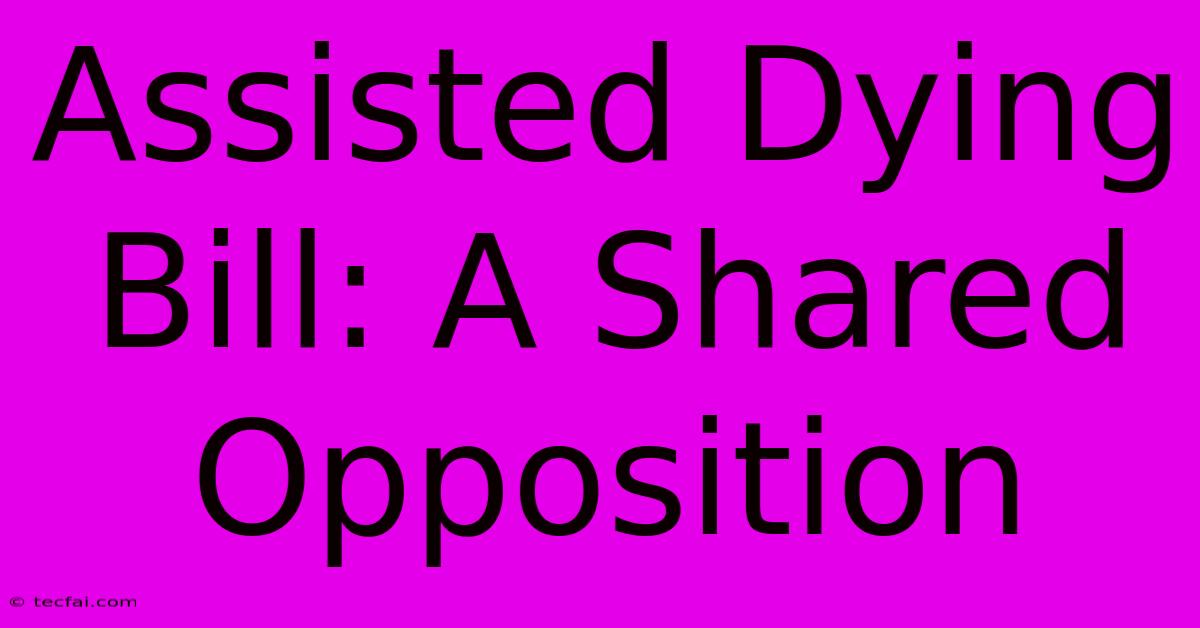Assisted Dying Bill: A Shared Opposition

Discover more detailed and exciting information on our website. Click the link below to start your adventure: Visit Best Website tecfai.com. Don't miss out!
Table of Contents
Assisted Dying Bill: A Shared Opposition Across the Political Spectrum
The debate surrounding assisted dying continues to be one of the most polarizing in modern politics. While proponents champion autonomy and the right to a dignified death, a significant and diverse opposition remains, united not by a single ideology, but by a complex web of ethical, practical, and societal concerns. This shared opposition transcends traditional political divides, finding common ground amongst individuals and groups with otherwise vastly different viewpoints.
Ethical Concerns at the Heart of the Matter
One of the most fundamental arguments against assisted dying legislation centers around ethical considerations. Opponents often raise concerns about the slippery slope – the fear that legalizing assisted dying for terminally ill patients could lead to its expansion to encompass individuals who are not terminally ill, or even those who are deemed to be a burden on society. This fear is rooted in the belief that human life is inherently valuable, regardless of its perceived quality or length.
Furthermore, the issue of vulnerable populations is a key ethical concern. Opponents worry that individuals facing pressure from family members, financial difficulties, or feelings of worthlessness might be coerced into choosing assisted dying, even if it isn't their genuine desire. The potential for abuse and manipulation, they argue, necessitates a cautious and perhaps even prohibitive approach.
Practical Challenges and Implementation Issues
Beyond the ethical dilemmas, practical challenges in implementing assisted dying legislation also fuel opposition. The difficulties in defining terminal illness with absolute certainty present a significant hurdle. The subjectivity inherent in assessing prognosis and the potential for misdiagnosis raise concerns about unintended consequences and the possibility of individuals choosing assisted dying prematurely.
Ensuring safeguards and oversight is another significant practical challenge. The need for rigorous processes to verify patient capacity, consent, and the absence of coercion requires a complex and resource-intensive regulatory framework. Opponents argue that the current healthcare system may lack the resources and expertise to adequately manage such a system, potentially leading to errors and unintended harm.
Societal Impact and the Role of Palliative Care
The potential impact on society as a whole also features prominently in the arguments against assisted dying. Some opponents worry that legalizing assisted dying could subtly shift societal attitudes towards the value of human life, potentially diminishing the importance placed on palliative care and end-of-life support. They argue that a strong focus on high-quality palliative care should be prioritized to ensure that patients receive the best possible comfort and support in their final stages of life. This includes pain management, emotional support, and spiritual guidance, aiming to provide a dignified and peaceful end-of-life experience without resorting to assisted dying.
A Shared Goal: Dignity and Respect
It’s crucial to understand that the shared opposition to assisted dying legislation isn’t rooted in a desire to deny individuals compassion or control over their end-of-life choices. Rather, it stems from a deep concern about protecting vulnerable individuals and upholding the inherent value of all human life. The ultimate goal, shared by both proponents and opponents, is to ensure dignity and respect for all individuals as they approach the end of their lives. The difference lies in the methods and safeguards believed necessary to achieve that goal. Further dialogue, careful consideration, and a focus on improving palliative care are essential to navigate this complex and emotionally charged debate.

Thank you for visiting our website wich cover about Assisted Dying Bill: A Shared Opposition. We hope the information provided has been useful to you. Feel free to contact us if you have any questions or need further assistance. See you next time and dont miss to bookmark.
Featured Posts
-
11 Sunod Na Talo Ng Wizards
Nov 26, 2024
-
Intech Adds To Tjx Holdings
Nov 26, 2024
-
Reddits Free Content Strategy
Nov 26, 2024
-
Ravens Chargers Monday Night Football Schedule
Nov 26, 2024
-
Bayern Ucl Expert Predictions
Nov 26, 2024
